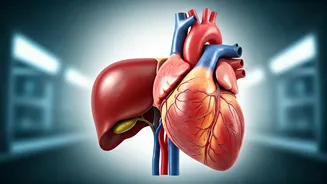Weight Gain's Subtle Impact
The effects of weight gain extend far beyond what is visible. It subtly but significantly strains vital organs, setting the stage for serious health issues.
This silent burden can increase the chances of type 2 diabetes, heart disease, and liver damage, making even small weight gains a concern. This added weight doesn't just sit idly; it actively disrupts bodily functions, influencing everything from insulin sensitivity to overall organ health. Recognizing this quiet yet dangerous influence is the first step in protecting your well-being. Understanding this impact is crucial for early intervention and a proactive approach to health.
Abdominal Fat's Role
Excess abdominal fat plays a particularly dangerous role. It isn’t just about the numbers on the scale; where you carry the weight matters. Abdominal fat is metabolically active, meaning it releases substances that can cause widespread issues. This type of fat often triggers insulin resistance, making it harder for your body to process sugar and increasing the risk of diabetes. Moreover, it drives inflammation throughout the body, impacting the kidneys and gut. This means the health of your digestive system and your kidneys are directly influenced by the accumulation of abdominal fat, underscoring the necessity of controlling weight around the midsection.
Risks of Type 2 Diabetes
Increased weight dramatically elevates the risk of developing type 2 diabetes. The link between weight gain and diabetes is largely due to insulin resistance, a condition where cells become less responsive to insulin. As weight increases, especially abdominal fat, cells struggle to effectively use insulin to regulate blood sugar, leading to a rise in glucose levels. Over time, this chronic elevation of blood sugar damages blood vessels and nerves, leading to complications like heart disease, kidney problems, and vision loss. Managing weight through healthy eating and consistent exercise is key to preventing or delaying the onset of type 2 diabetes and its associated health risks.
Heart Disease Connection
Weight gain is also directly linked to an increased risk of heart disease. The strain on the heart from carrying extra weight can lead to a variety of cardiovascular issues. Excess weight often leads to elevated blood pressure and unhealthy cholesterol levels. These conditions can damage the arteries and increase the risk of plaque buildup. Over time, these factors can result in heart attacks, strokes, and other serious cardiovascular events. Lifestyle choices like a balanced diet and regular physical activity can substantially mitigate these risks, supporting both heart health and overall longevity.
Liver and Gut Health
The liver and gut are also significantly impacted by weight gain. Excess weight can contribute to fatty liver disease, a condition where fat accumulates in the liver. This can impair liver function, potentially leading to inflammation, scarring, and even liver failure. Simultaneously, weight gain negatively affects the gut microbiome, the complex community of microorganisms living in your digestive tract. Imbalances in the gut microbiome can increase inflammation, compromise nutrient absorption, and contribute to various digestive problems. Maintaining a healthy weight helps to support the liver's function and ensure a balanced and healthy gut environment, essential for overall health.
Kidney Health Concerns
Kidney health is also affected by weight gain. Obesity can increase blood pressure and the risk of diabetes, which are major causes of kidney disease. Increased pressure in the kidneys damages the delicate filtering units, gradually reducing their ability to remove waste and excess fluids from the body. Weight management is crucial for protecting the kidneys. By adopting a healthy lifestyle, you can help reduce the strain on the kidneys and slow down the progression of kidney damage, thereby improving overall kidney health.
Monitoring Weight and Waist
Regular monitoring of your weight and waist size is essential for health. These simple measurements can provide valuable insights into your overall health. Tracking your weight regularly allows you to detect any concerning patterns early on. Measuring your waist circumference is particularly important, as it gives an indication of abdominal fat levels. Keeping an eye on these metrics will help you to address any issues promptly. This proactive approach helps in early intervention. Maintaining a healthy weight and waist size provides a comprehensive strategy for safeguarding your health.
Healthy Weight Strategies
Maintaining a healthy weight demands a multi-pronged strategy encompassing diet and exercise. Focusing on nutritious foods and reducing processed items can significantly influence your body weight and overall health. Regular physical activity, including a blend of cardiovascular exercises and strength training, aids in both weight management and improved metabolic function. Making these lifestyle changes will not only protect against metabolic issues but also boost the overall function of your vital organs, thus increasing longevity and quality of life. Consistent implementation of these strategies supports long-term health benefits.
Protecting Organ Function
By adopting healthy habits, you can protect your vital organs and improve your overall well-being. A balanced diet, regular exercise, and consistent monitoring of your weight and waist size are key components. These practices reduce the risk of organ damage, improving overall function. Prioritizing these healthy choices helps safeguard against serious conditions and promotes long-term vitality. The goal is to enhance overall organ function and increase your chances of a healthy, fulfilling life. Make these habits a part of your everyday routine for a healthy, active future.












